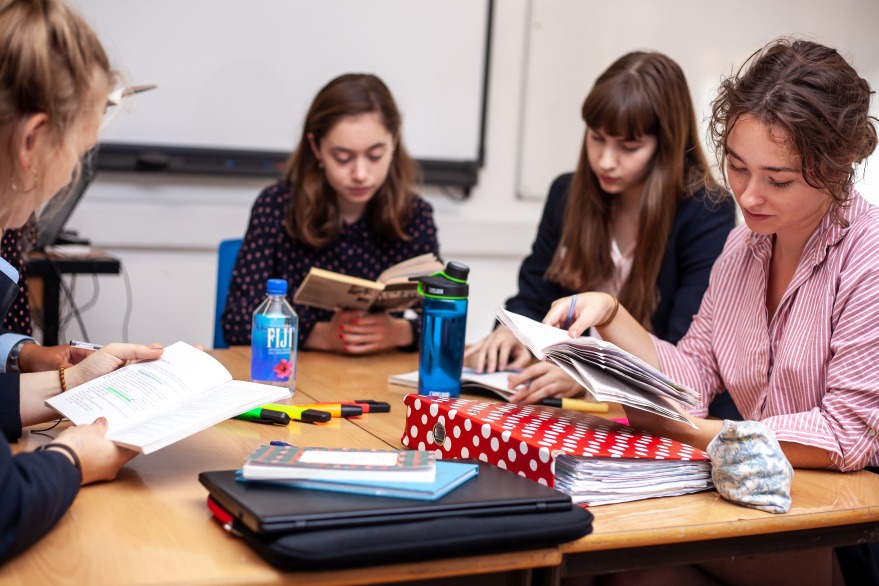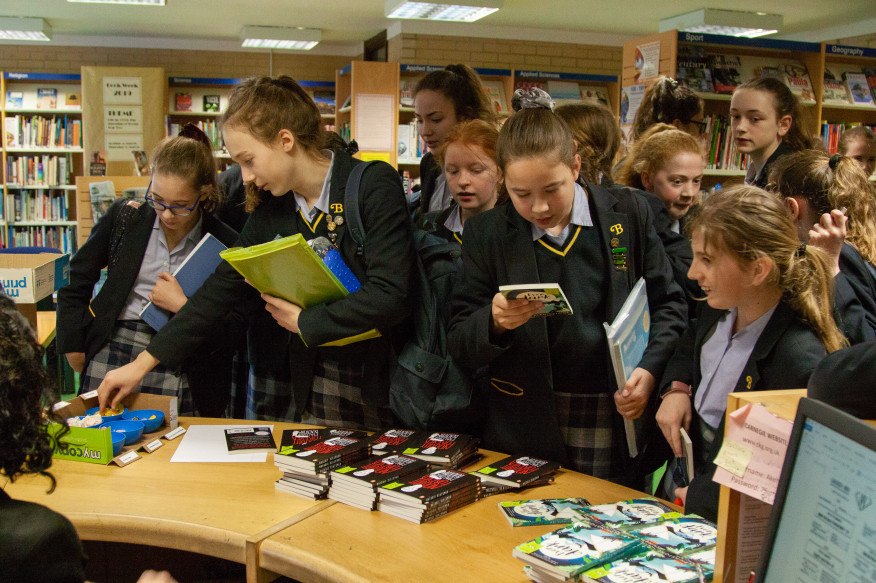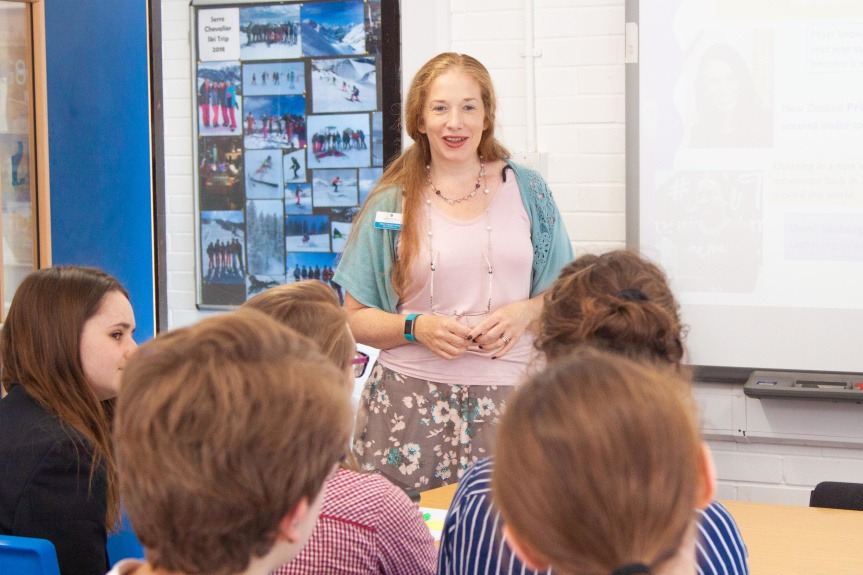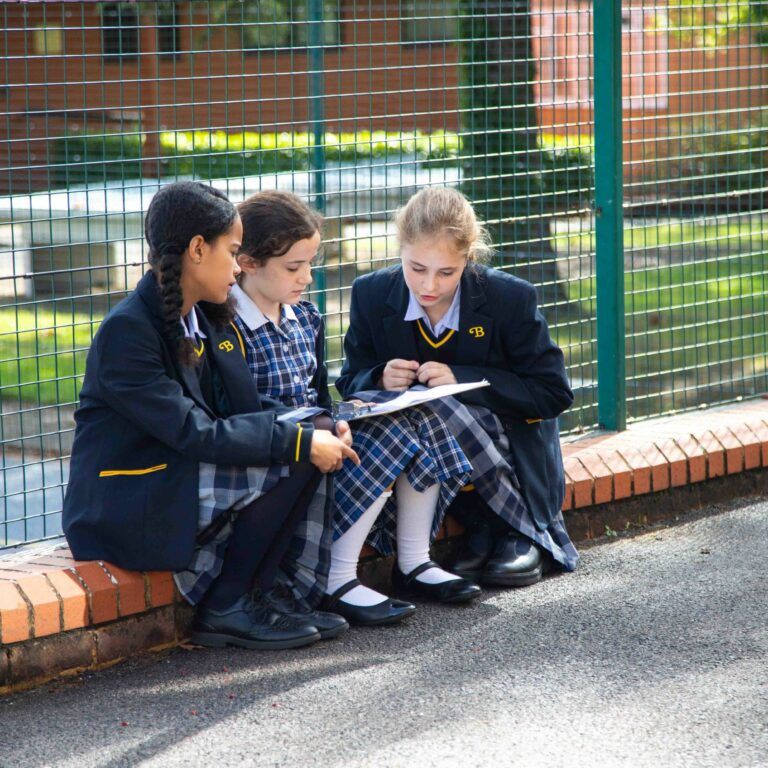The benefits of reading have long been extolled, but during lockdown novels have become even more treasured; their ability to transport us to another world has been a tonic to the stress and uncertainty of life during the pandemic. Burgess Hill Girls is a school with holistic aims: to achieve both academic excellence and positive wellbeing. In March 2020 we introduced a ‘Book of the Week’ campaign to support the pupils and wider school community during these unprecedented times.
The pupil who reads at home will have obvious advantages in English lessons. The more a child reads for pleasure, the better their reading will be at school. Additionally, readers are also better writers. Reading improves a pupil’s grammar, composition and gives pupils a greater breadth of vocabulary. The benefits of reading spread further than the English classroom, however. Reading a book is akin to taking your brain to the gym: it improves your intelligence. The brain lights up like a firework display when observed reading under an ECG, which might explain why an enthusiastic reader will gain higher exam results than their peers, even in subjects such as Maths. Proven to be more influential than having well-educated parents, reading leads to achievements. This success is not limited to schools, for reading books is the only extra-curricular activity that has a positive correlation with obtaining a managerial or professional job.

Reading literature not only makes us smarter, it also makes us more compassionate, for the art of the novel is to transport us into someone else’s story. The reader cannot be rigid and insular; they are forced to expand their perspective and to empathise. As Harper Lee explains in To Kill a Mockingbird, ‘You never really understand a person until you consider things from his point of view… until you climb in his skin and walk around in it.’ As we read, we climb into a character’s skin and walk around through their story. We are immersed in a new view of the world and thus, through reading a novel, we have an insight into other minds, which helps us to be more liberal, inclusive and to approach life with more creativity.
Literature is our way of reflecting our experience of the world, but while novels encourage diverse and ever expansive understanding, they also nurture and comfort us. Dr Samuel Johnson, who suffered from severe bouts of depression, said in the 18th century, ‘the only end of writing is to enable the reader better to enjoy life or better to endure it.’ Novels can help us understand and cope with times of deep emotional strain. Coronavirus aside, the epidemic which has a grip on the modern world is the rising tide of mental health problems. Reading is restorative. While various studies have highlighted the curative benefits of reading on our wellbeing, the reasons for this recuperative influence are complex. Reading releases endorphins, our happy chemical. In addition, reading is a therapeutic escape from the trivialities which can consume us. We all face emotional challenges; relationships can be complex and life deals us a mixture of fortunes, some good and some bad. The realisation that this is a collective experience is both reassuring and healing. Thus novels unite us and define our humanity.
In an age when reading is in competition with so many other forms of communicational and technological stimulation, we aspire that pupils leave Burgess Hill Girls equipped and keen to read. The library, called the Learning Resource Centre (LRC) is at the heart of our school, both physically and as a part of the girls’ routine; it buzzes with pupils at break, lunch and afterschool. The English Department works alongside Ms Akehurst, Head of the LRC, delivering dedicated reading lessons, reading rewards, clubs and events.

Our ‘Book of the Week’ campaign aims to foster reading at home, by recommending books which are both entertaining and stretching. From two year olds to adults, we have novels for all age groups. More recently we have adapted our lists to reflect our times. We supported the Black Lives Matter campaign with a week of recommendations celebrating black authors and we are planning a summer holiday list which will transport you around the world, which for most of us, might be our only way to travel abroad this summer. These lists are available on our social media sites and here on our website, where we have also included a small synopsis and a link to buy the books.
Reading helps us academically, but also psychologically, spiritually and collectively. Shakespeare wrote in The Tempest, ‘Books are the engines of change, windows on the world, a lighthouse erected on the sea of time.’ Create a culture of reading in your home; it is a gift that your child will treasure forever.
Sarah Kruschandl, Head of English, Burgess Hill Girls

HOW TO ENCOURAGE READING
As well as our recommendations, here are some suggestions about how you can encourage reluctant readers, for as with anything, performance improves with practice.
- Bring books into your home. Consider how bookshops entice us to buy books, and choose books to face forward on the book shelf. Rotate your book displays, every few weeks.
- Establishing reading routines, such as 20 minutes before bed, will help develop good reading habits.
- Ask your child about the book they are reading. Ask your child to recall and summarise the story, about the characters and issues that the book explores; what they enjoyed about the book and ask them to read their favourite section.
- Reading with your child, no matter the child’s age, helps to build a lifelong love of reading and can become a cherished time together.
- Visit your local library or bookstore on a regular basis.
- Become a reading role model. Let your child see you reading and demonstrate the pleasure of reading.
- Allow your child to read for pleasure. While we might desire our children to become widely read, developing a love of reading is the priority. Praise their reading and gently, over time encourage them to expand their horizons.
- Don’t tidy books away; leave them lying around in different rooms, purposefully placing books where your child might pick them up.
- Read about reading. Become familiar with what’s current, winning prizes and in vogue.
- Read the same book your child has chosen and let the discussions commence. Teenage fiction is actually very enjoyable.
- Don’t give up. Children will understand the joy of reading when they find a book that they love. Some won’t find this book until they are older.
‘There is more treasure in books than in all the pirates’ loot on Treasure Island and best of all, you can enjoy these riches every day of your life.’ Walt Disney


